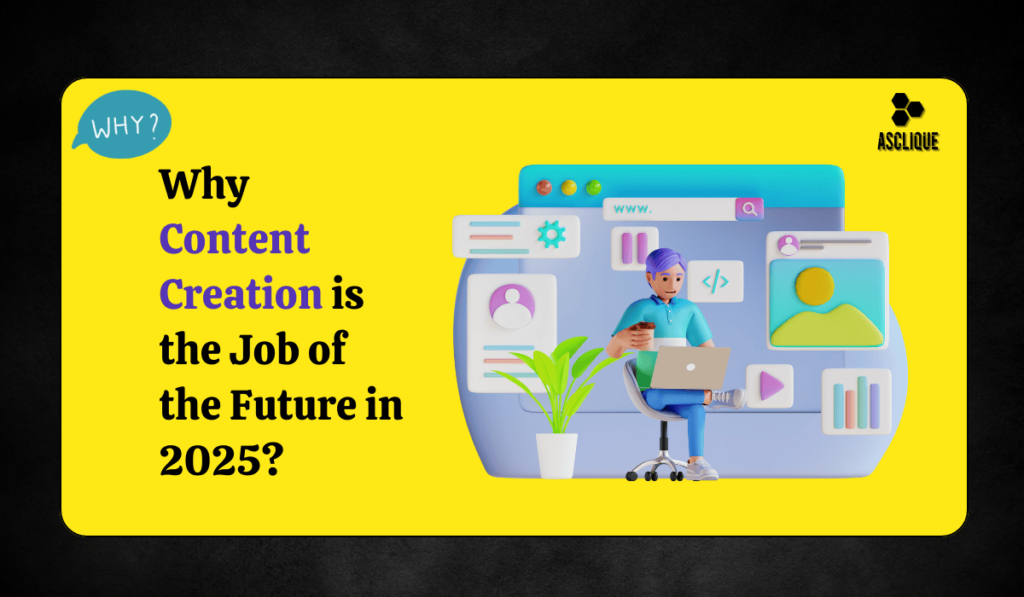The most in-demand profession and highly dynamic line of work is that of content creation for this digitalised world. Of course, no businesses, brand, or personal names want to put up ‘cool’ enough content that’ll be able to draw them a considerable audience on social media or anywhere else online. That explains is content creation a popular job for their respective works. People want content creation. What makes content creation such a coveted profession for so many?
The Digital Age: An Evolving Hub for Content Generation
Information digestion and consumption have changed with this digital revolution. Adoption of social media, websites, blogs, and video streaming services have altered the way the brand communicates with its target audience. Therefore, there is a growing need for interesting and quality content, which makes content creation an integral component of marketing strategy.
The forms of content created included videos and blog posts, social media posts, infographics, etc. Their contribution is crucial as it makes an audience feel something about a brand or sparks customer interest in the contemporary economy.
Why Content Creation Jobs Are in Great Demand?
Creative Freedom
- The best thing about content creation is probably the creative freedom it provides. This opportunity allows them to express themselves, show off their skills, and suggest brand new ideas that might sound interesting to listeners or readers. Be it a captivating story written compellingly or designing the best visuals for viewing or producing original videos, there is scope for everything.
Diverse Opportunities
- Content creation cuts across all industries. From fashion to technology, education, and entertainment, creative skills are in demand. The diversification means one can always opt for areas they feel most enthusiastic about and work towards those areas.
High Demand in Marketing
- Businesses have always needed content to promote their different products and services. Therefore, from SEO-optimized blog posts to raging social media posts, the role of content creation within the digital marketing strategies of the businesses is pretty crucial. This steady demand ensures an ongoing flow of job opportunities.
Remote work potential
- Content creation is even more attractive with the ability to work remotely. With a laptop and internet connection, content creators can work from anywhere in the world and thus be able to enjoy the most ideal work-life balance possible.
High Pay
- Professional content creators who have gained rich, relevant portfolios will be paid the right amount for their work. Many content creators earn through freelancing, collaborations with brands, or by creating their own online presence and monetizing it through their content.
What Does a Content Creator Do?

Content Ideation:
- Align ideas with the brand’s overall goals, target audience, and marketing objectives.
- Research audience preferences and industry trends to stay relevant.
- Coordinate with teams (marketing, design, etc.) for coherence and quality.
Content creation
- Create valuable content through diverse platforms like video, blog content, social media posts, infographics, podcasts, and much more.
- Video editors, graphic design tools, CMS, and the like will be used to provide high-quality content.
- Content optimization is required depending upon the platform being social media, website, or email campaigns
- Balancing creativity with its execution like SEO, optimizing images, and the like.
Audience Interactions
- End This will respond to comments, messages and reviews for two-way communication with the audience
- Actionables, voting options, or other interactive questions asking for feedback from the users.
- Keep observing content that brings about the highest engagement.
- Building communities by showcasing and nudging consumer-created content for continued conversations
Analytics Monitoring
- Follow and monitor how your content performs through Google Analytics, or insights in each of the respective social media applications or third-party analytics.
- Review page views, clicks, likes, shares, and conversion rates.
- Apply the findings to enhance the content strategy to improve engagement and optimize subsequent content creation.
- Test different types of content, headlines, and visuals to establish what truly matters to the target audience.
Present and Future Trends
- Keep tabs on the trends in content today, industry updates, and any changes that hit the algorithms on those platforms.
- Tap into popular trends, hashtags, and viral content to increase visibility and relevance.
- Test new content formats, like TikTok videos or live streams, to engage a wider audience.
- Rapidly adjust the content strategy for emerging trends or changes in audience behavior.
Content Distribution
- Plan and schedule content in the content calendar and publish it timely on the platforms – social media, blogs, and newsletters.
- Automate posting through distribution tools – Buffer, Hootsuite
- Paid promotions – Facebook Ads, Google Ads – of high-performing content.
- Co- partnership with influencers, fellow creators or brands to reach a much larger audience.
Content Optimization
- Maximize Organic Traffic through Search Engine Optimization.
- Utilizing the proper keywords, meta tags, and descriptions in altering content to best search engine rankings.
- Make the content accessible from mobile and accessible for all users
- Analyzing the feedbacks and continuously refining content quality with responses and reactions of an audience
Content Repurposing
- Using existing content in new formats and media, such as turning the blog post into a podcast or social media post.
- Refreshing the older content with new relevance for it to rank higher in search.
- Using popular content to come up with the spin-off, or a newer version for some specific audience target.
Professionals are the one who combines creativity and strategy together. The function is critical for engaging audiences and also for brands meeting their business needs. The task involves being open to change, technical skills, analytical thinking, and being able to be at least one step ahead of the ever-changing digital landscape.
Types of Content Creation Jobs
Content creation jobs include a diversity of roles for a specific range of skills and interests.
- Social media manager: He creates and schedules posts, monitors, and manages accounts, requesting engagement that would make the brand more visible and interactive.
- Video Producer: This is the person who is going to produce content for YouTube, TikTok, or Instagram, which is bound to grab viewers’ attention. He shoots and edits the content. Sometimes, he even scripts the material.
- Blogger: That person is going to write articles in various niches such as travel, technology, health, or personal development. A blogger is working with SEO so that there is more traffic and reach.
- Graphic Designer: Make content beautiful with the addition of website, advertisement, infographic, or social media visuals with a combination of creativity and the proper technical application in tools such as Adobe Illustrator or Canva.
- Podcast Host: Recording and creating audio for a topic or theme, whether it is a guest show or a solo cast for entertainment value or learning something particular.
- Freelance Content Writer: Articles, product descriptions, marketing copy, and more-and-more projects, industries, and topics.
These roles, like these, present dynamic opportunities in content creation, and through them, one can apply their creativity and expertise across various mediums.
Skills to Attain Excellence in Content Creation
To be successful in content creation, one needs a mix of creative and technical skills in coming up with work that influences and engages the audience. Some of the skills include:
- Creativity: The base of creating content comes through creativity, and the process of finding new ideas that engage the audience with the help of the brand.
- Technical skills: One is well conversant with the tools applied for making quality content. The example could be of Adobe Photoshop and Canva or video editing and a content management system.
- SEO skills: It should have the idea about search engine optimization. In short, one will get an idea that if it reaches the target audience or not. Keyword research would include it, thus the on-page technique is followed in metadata for optimizing the post.
- Ability for storytelling: Create a good story that makes a viewer feel emotional attachment to what is being used. Therefore remembered and actioned.
- Adjustability: In digital landscapes, change is occurring at a warp speed, which requires the makers to adjust the strategies in motion to keep the pace with changed trends, algorithms, and viewer preferences.
By acquiring those skills, content creators can develop interesting, effective, and result-orientated material to attract one’s audiences in a highly competitive marketplace.
Challenges in Content Creation
A very rewarding profession is content creation but has its share of challenges
- Consistency: Making quality content, as expected of the audience might be very challenging and time-consuming.
- Competition: When people are so many creating, there is the need to be original and innovative.
- Burnout: The creativity may not meet deadlines, which is stressful and causes burnout, affects productivity, and inspiration.
- The algorithm of the social media and the search engine optimization also keeps changing. So, update yourself about that to remain in the visibility of the people as well as for getting engaged by them.
Those obstacles can easily be overcome if the person is agile, resilient and has a good strategy.
How to Succeed as a Content Creator
- Content portfolio: Keep the best for attracting the probable clients or employees.
- Network: Connect with other creators and industry professionals for collaboration and learning.
- Stay on top of trends, tools, and industry shifts in order to avoid being left behind.
- Connect with your audience: Authentic interaction builds trust and loyalty.
- Invest in your skills: Take courses or workshops to elevate your craft.
Can Content Creation Be a Full-Time Profession?
Yes. The world of the digital platform continues to grow. There will always be a need for content. As more businesses and individuals recognize the need for good content, so much more prolific the opportunities will be for creators. Content creation is a leverage point for a creator’s form of talent by defining and diversifying sources of income: ad revenue, sponsorships, merchandise, and others.
Conclusion
Well, yes, a job like this of great demand with most liberating in that way because you choose creativity itself. So, such a future trend related to this space of content creation and its effects will keep happening, really going on to create a role of shaping communications either with information or consuming it.
Whether one is a budding content creator or simply curious about this exciting field, now is the time to take the first step and discover all that it can bring.
FAQs
Is content creation a good career choice?
Yes, content creation is a very rewarding and profitable career. It has gained much traction in terms of demand for digital content and allows the flexibility of creativity, besides other benefits and opportunities across different industries.
What does a content creator need?
Any formal education in marketing, communications, or design helps, but skills in writing, video editing, and SEO often prove to be more useful in practice.
How to be a content creator?
Identify your niche and portfolio. Leverage the Web for promotion of the work that is done. The platform could be any blog, YouTube, or even social network.
How are content creators paid?
Content creators make money by forming brand partnerships, through sponsored content, ad revenue, freelancing, and even digital products sales in form of courses or e-Books.
What tools do content creators use?
Some of the popular ones include Canva and Adobe Photoshop when design elements are involved, Final Cut Pro and Premiere Pro for video editing, and CMS platforms such as WordPress when publishing is involved.

